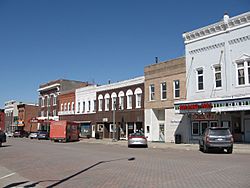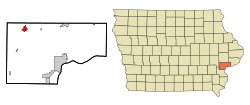West Liberty, Iowa facts for kids
Quick facts for kids
West Liberty, Iowa
|
|
|---|---|

Downtown West Liberty, Iowa
|
|
| Motto(s):
Community of Opportunity
|
|

Location of West Liberty, Iowa
|
|
| Country | |
| State | |
| County | Muscatine |
| Area | |
| • Total | 1.77 sq mi (4.58 km2) |
| • Land | 1.77 sq mi (4.58 km2) |
| • Water | 0.00 sq mi (0.00 km2) |
| Elevation | 676 ft (206 m) |
| Population
(2020)
|
|
| • Total | 3,858 |
| • Density | 2,183.36/sq mi (842.97/km2) |
| Time zone | UTC-6 (Central (CST)) |
| • Summer (DST) | UTC-5 (CDT) |
| ZIP code |
52776
|
| Area code(s) | 319 |
| FIPS code | 19-84315 |
| GNIS feature ID | 0462879 |
West Liberty is a friendly city in Muscatine County, Iowa, United States. In 2020, about 3,858 people lived here. It is part of the larger Muscatine area.
West Liberty is easy to find, located just five miles south of Interstate 80 on Historic Highway 6. The city is famous for the West Liberty Raceway, which is at the Muscatine County Fairgrounds. Every July, the exciting Muscatine County Fair takes place right here in West Liberty.
Contents
Discovering West Liberty's Past
West Liberty became an official city in 1868. This happened when two important railroads, the Chicago, Rock Island and Pacific and the Burlington, Cedar Rapids and Northern, met here.
Before 1868, the town was about half a mile north of its current spot. It moved closer to the railway lines to make travel and trade easier. The original name for the area was Wapsinonoc Township. This name means "smooth surfaced, meandering creek or stream." The town's name changed to Liberty, inspired by Liberty, Ohio, where many early settlers came from. It is believed this name change happened after the town moved.
Where is West Liberty Located?
West Liberty is located at 41°34′17″N 91°15′40″W / 41.571517°N 91.261229°W.
The city covers a total area of about 1.74 square miles (4.5 square kilometers). All of this area is land, with no large bodies of water inside the city limits.
Who Lives in West Liberty?
| Historical populations | ||
|---|---|---|
| Year | Pop. | ±% |
| 1880 | 1,141 | — |
| 1890 | 1,268 | +11.1% |
| 1900 | 1,690 | +33.3% |
| 1910 | 1,666 | −1.4% |
| 1920 | 1,834 | +10.1% |
| 1930 | 1,679 | −8.5% |
| 1940 | 1,802 | +7.3% |
| 1950 | 1,866 | +3.6% |
| 1960 | 2,042 | +9.4% |
| 1970 | 2,296 | +12.4% |
| 1980 | 2,723 | +18.6% |
| 1990 | 2,935 | +7.8% |
| 2000 | 3,332 | +13.5% |
| 2010 | 3,736 | +12.1% |
| 2020 | 3,858 | +3.3% |
| Source: and Iowa Data Center Source: |
||
Population in 2020
In 2020, there were 3,858 people living in West Liberty. There were 1,321 households, which are groups of people living together. The city had about 2,179 people per square mile.
Many different groups of people live in West Liberty. About 58.3% of the population identified as Hispanic or Latino. This makes West Liberty a very diverse community.
The average age in the city was 33.4 years old. About 32.7% of residents were under 20 years old. This shows that West Liberty has many young people and families.
Population in 2010
In 2010, West Liberty had 3,736 people. The city was home to 1,251 households. West Liberty became the first town in Iowa where more than half of the population was Hispanic or Latino.
The average age was 32.8 years. About 29.5% of residents were under 18 years old. This shows a growing and youthful community.
West Liberty's Economy
West Liberty has two main employers that help the city's economy. These are the West Liberty Community School District and West Liberty Foods. West Liberty Foods makes turkey products and has its main office and a processing plant here.
Farming, building new homes, and businesses related to agriculture are also very important to the local economy. The West Liberty Industrial Park is a special area for businesses on the south side of the city.
Helping Downtown Grow
West Liberty's downtown area is special because it is listed on the National Register of Historic Places. This means it has important historical buildings.
A group called the Downtown Task Force works to improve the downtown area. They partner with an organization called We Lead. They want to make the downtown area even better for businesses and visitors. Recent projects include helping old buildings and offering money for improvements.
Arts and Culture in West Liberty
West Liberty is a historic town with many fun cultural events. It has an old movie theater built in 1910. There is also an internationally known puppet theater that puts on shows all year.
The city has two dance studios and an arts council. The arts council organizes art lessons in winter and concerts in summer. West Liberty also has a historic train depot from 1897 and a public library built in 1904.
Fun Festivals and Events
West Liberty is home to the Muscatine County Fairgrounds. This is where the biggest event of the year, the Muscatine County Fair, happens every July. The fair has exciting shows, a carnival, and talent contests. You can also see animals, arts and crafts, and delicious food. Many of the fairground buildings are very old and original.
Before the fair, there's a Fair Parade and Picnic in the Park. The parade has floats made by the community. After the parade, everyone enjoys a free swim, food, and entertainment at Kimberly Park.
Another summer event is Summer Music in the Park. Local groups play different types of music, like blues and Latin American folk music. These free concerts happen every Friday evening in Ron-de-Voo Park.
The West Liberty Children's Festival takes place every September. It's a day-long event downtown with puppet shows, crafts, and games. Local dance studios perform, and there's food from local vendors. In recent years, it has joined with the Latino Festival, which adds live Latino music and Mexican food. This big event is called Fiesta West Liberty.
From April to August, the West Liberty Raceway hosts car races almost every Saturday night. It's a 1/2 mile dirt track where different types of race cars compete.
Exploring Local History at the Museum
The old Rock Island Railroad Depot, built in 1897, is now a museum. It shows items from West Liberty's past and the history of the railway.
The area around the depot is called Heritage Park. It's like an outdoor museum with many historical pieces. You can see an old train car (a caboose), a local barn, antique farm equipment, and a tourist cabin. There's also a one-room schoolhouse and a steam locomotive.
West Liberty Public Library
The West Liberty Public Library building was built in 1904. It received money from Andrew Carnegie to help build it. The library has a long history, starting as a temperance library.
The library building is a State Historical Building. It has been updated and expanded over the years, most recently in 2012–2013. The library offers many activities, like summer reading programs, movie screenings, and book clubs.
Education in West Liberty
The West Liberty Community School District (WLCSD) has elementary, middle, and high schools. A new high school was finished in 2004. A new middle school opened in 2009, using parts of the old high school.
The school district teaches over 1,220 students. There are about 11 students for every teacher. West Liberty High School was ranked as the 8th best high school in Iowa in 2013.
Learning Two Languages: Dual Language Program
West Liberty schools are special because they are International Spanish Academies (ISAs). This means students can earn special Spanish diplomas from the Instituto Cervantes. The Spanish government recognizes these academies.
The WLCSD Dual language Program lets students take all their classes in both Spanish and English. This helps them become bilingual and understand another culture better. Students start the program in pre-kindergarten and continue through fifth grade.
West Liberty's Dual Language Program was the first of its kind in Iowa. It started in 1997 with a grant from the U.S. Department of Education. By 2011, students in all grades from kindergarten to 12th grade were part of this program.
Parks and Fun Activities
West Liberty has eight city parks for everyone to enjoy. These parks vary in size and purpose. Some are memorials, while others have a public pool or sports complex. The sports complex has fields for softball, baseball, and soccer, plus a skatepark.
The city parks include:
- Dutton Park
- Friendship Park
- Railroad Park
- Ron-De-Voo Park
- Sesquincentennial Park
- Veterans Memorial Park
- Wapsie Park
- Kimberly Park
West Liberty also has part of the Hoover Nature Trail. This trail starts at the old train depot and goes north. Near the depot, there's an outdoor fitness center with exercise equipment for public use.
For golf lovers, there's the West Liberty Golf & Country Club. It has a nine-hole golf course and a restaurant. The club also hosts various golf tournaments.
The West Liberty Gun Club is a shooting range on the edge of town. It has outdoor ranges for shooting and archery. The club holds matches for people of all skill levels.
Local News and Media
The West Liberty Index is the local newspaper. It has been reporting news since 1868. It covers news from West Liberty and nearby towns like Nichols and Atalissa. The West Liberty Public Library has old copies of the newspaper on microfilm from 1878 to 1946.
Community Involvement
Many groups in West Liberty help the community. These include the local Lions Club, Rotary Club, West Liberty Area Arts Council, P.E.O, Aquarius Club, and the League of United Latin American Citizens (LULAC). These organizations work to make West Liberty a better place.
City Services
West Liberty gets its phone, cable, and internet services from Liberty Communications, a local company. The city has fast internet thanks to a fiber optic network.
The city also provides water, electricity, and sewer services. West Liberty even generates its own electricity, which is something only 64 cities in Iowa can do. The city's solid waste department handles garbage pickup and recycling. They also offer dumpster rentals and yard waste pickup.
See also
 In Spanish: West Liberty (Iowa) para niños
In Spanish: West Liberty (Iowa) para niños
 | Isaac Myers |
 | D. Hamilton Jackson |
 | A. Philip Randolph |

